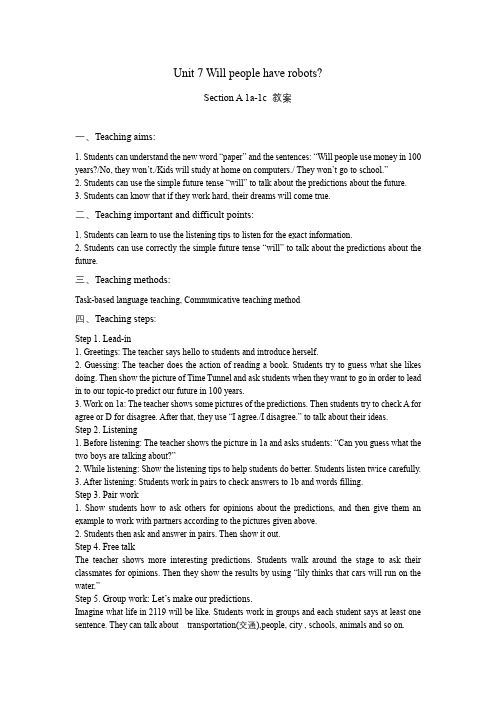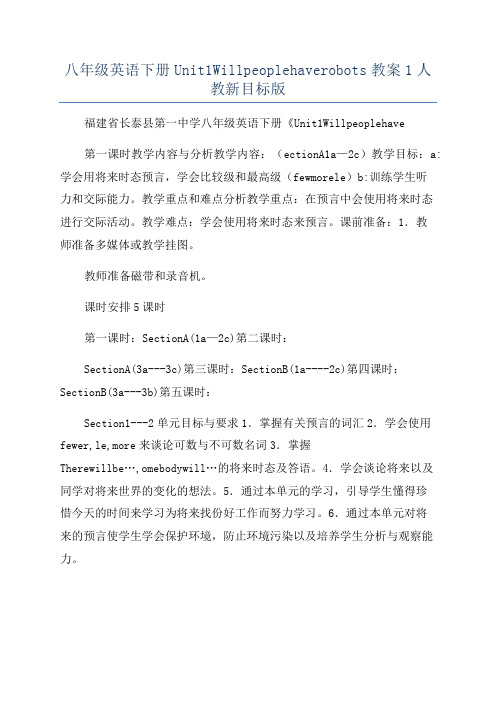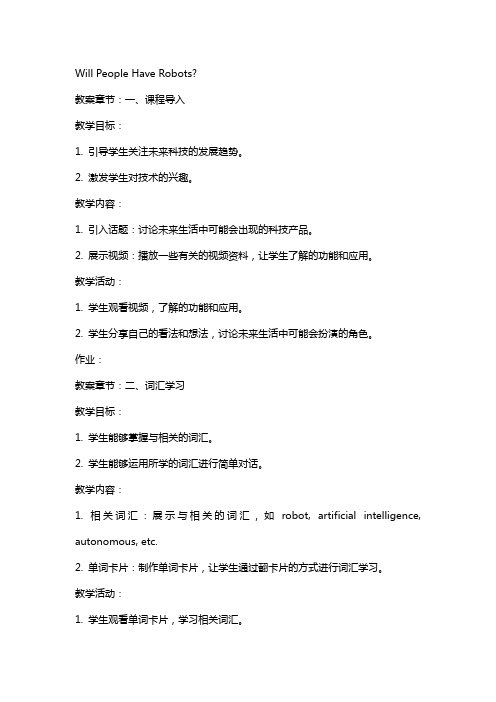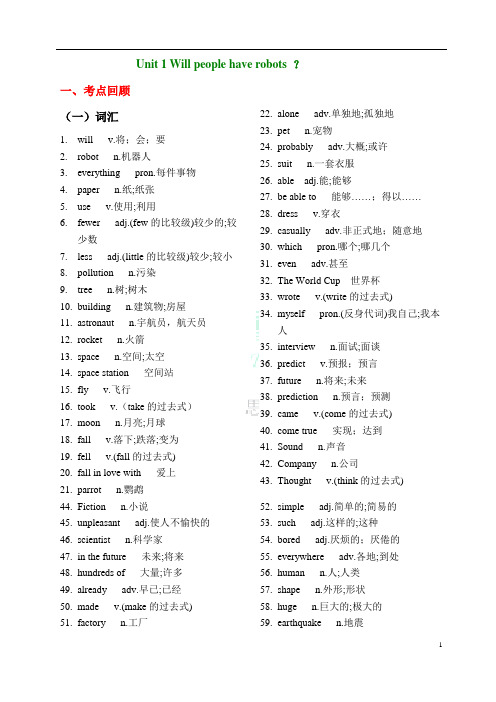《Will people have robots》第1课时教案
[初二英语]Unit1Willpeoplehaverobots教案
![[初二英语]Unit1Willpeoplehaverobots教案](https://img.taocdn.com/s3/m/071ab7cd192e45361166f528.png)
英语教学案Teachers believe we are the best! We study hardest!(相信我们是最棒的!我们是最努力学习的同学!)Name:Grade:2009-2-14Unit 1 Will people have robots?Learning aims(学习目的) of Unit 1.1.掌握:⑴ All the new words in Unit 1.(2) Phrases.(3) 时态: will构成的一般将来时陈述句;主语+will do sth.?否认句:主语+won’t do sth.一般疑问句:Will +主语+ do sth.?肯定答复:Yes,主语+will.否认答复:No,主语+won’t.特殊疑问句:特殊疑问词+ will +主语+do sth.?There be 句型的一般将来时.There will be sth.2. 背熟:(1)P2. 1a (2) P6 .3a (3) P7 Part 2.Period 1(第一课时) Page2--3预习:1.掌握下面的words: will ,robot, won’t, they’ll, she’ll, I’ll, everything, paper, fewer→less, pollution, tree,building, astronaut, rocket, space→space station, fly, took, moon, fall〔过〕 fell→fall in love with.out these phrases and remember them.⑴在将来⑵免费⑶活到200岁⑷在将来的100年里⑸更多的污染→很多污染⑹更少的污染→几乎没污染3.⑴理解will 构成的一般将来时的构造。
陈述句、否认句、一般疑问句及肯定答复和否认答复的构造。
There be 构造的一般将来时构造。
八年级英语Will people have robots教案

Unit 7Will people have robots?第1课时Section A(1a~2d)教学步骤自主学习案1.学生自学新单词和词组(教材P49~50的单词),看谁记得又快又准。
(2分钟)【新词自查】2.根据句意及汉语提示完成句子。
(3分钟)(1)Everyone will have a computer in the future(未来).(2)I don’t know the books on the table are free(免费的).(3)The Mars is one of the nine planets(行星)of the sun.(4)We should do something from now to keep the environment (环境)clean.(5)I believe there will be less and less pollution(污染) in the future.课堂导学案Step 1情景导入参考案例T:Good morning,boys and girls! Do you want to study at home?S:Yes!T:We can’t do these things now,but we will do it in the future.We will be able to study at home on computer.And we will also have a robot at home to help us do housework.Do you know what the future will be like in the future? And what will happen in 100 years? Today let’s talk about them together.S:①There will be more cars.②There will be less fresh water.…环节说明:通过课前的一个师生问答互动环节引入新课话题。
Unit 7 Will people have robots第一课时教案

Unit 7 Will people have robots?Section A 1a-1c 教案一、Teaching aims:1. Students can understand the new word “paper” and the sentences: “Will people use money in 100 years?/No, they won’t./Kids will study at home on computers./ They won’t go to school.”2. Students can use the simple future tense “will” to talk about the predictions about the future.3. Students can know that if they work hard, their dreams will come true.二、Teaching important and difficult points:1. Students can learn to use the listening tips to listen for the exact information.2. Students can use correctly the simple future tense “will” to talk about the predictions about the future.三、Teaching methods:Task-based language teaching, Communicative teaching method四、Teaching steps:Step 1. Lead-in1. Greetings: The teacher says hello to students and introduce herself.2. Guessing: The teacher does the action of reading a book. Students try to guess what she likes doing. Then show the picture of Time Tunnel and ask students when they want to go in order to lead in to our topic-to predict our future in 100 years.3. Work on 1a: The teacher shows some pictures of the predictions. Then students try to check A for agree or D for disagree. After that, they use “I agree./I disagree.” to talk about their ideas.Step 2. Listening1. Before listening: The teacher shows the picture in 1a and asks students: “Can you guess what the two boys are talking about?”2. While listening: Show the listening tips to help students do better. Students listen twice carefully.3. After listening: Students work in pairs to check answers to 1b and words filling.Step 3. Pair work1. Show students how to ask others for opinions about the predictions, and then give them an example to work with partners according to the pictures given above.2. Students then ask and answer in pairs. Then show it out.Step 4. Free talkThe teacher shows more interesting predictions. Students walk around the stage to ask their classmates for opinions. Then they show the results by using “lily thinks that cars will run on the water.”Step 5. Group work: Let’s make our predictions.Imagine what life in 2119 will be like. Students work in groups and each student says at least one sentence. They can talk about transportation(交通),people, city , schools, animals and so on.Step 6. SummaryThe teacher asks students what they have learned this class, and sum up the simple future tense. Step 7. HomeworkImagine what your life will be like in twenty years or predict(预测) the future in 100 years . Write at least five sentences.。
八年级英语下册Unit1Willpeoplehaverobots教案1人教新目标版

八年级英语下册Unit1Willpeoplehaverobots教案1人
教新目标版
福建省长泰县第一中学八年级英语下册《Unit1Willpeoplehave
第一课时教学内容与分析教学内容:(ectionA1a—2c)教学目标:a:学会用将来时态预言,学会比较级和最高级(fewmorele)b:训练学生听
力和交际能力。
教学重点和难点分析教学重点:在预言中会使用将来时态进行交际活动。
教学难点:学会使用将来时态来预言。
课前准备:1.教
师准备多媒体或教学挂图。
教师准备磁带和录音机。
课时安排5课时
第一课时:SectionA(1a—2c)第二课时:
SectionA(3a---3c)第三课时:SectionB(1a----2c)第四课时:SectionB(3a---3b)第五课时:
Section1---2单元目标与要求1.掌握有关预言的词汇2.学会使用fewer,le,more来谈论可数与不可数名词3.掌握
Therewillbe…,omebodywill…的将来时态及答语。
4.学会谈论将来以及同学对将来世界的变化的想法。
5.通过本单元的学习,引导学生懂得珍
惜今天的时间来学习为将来找份好工作而努力学习。
6.通过本单元对将
来的预言使学生学会保护环境,防止环境污染以及培养学生分析与观察能力。
人教pep版八年级英语上册Unit7Willpeoplehaverobots第1课时教案

Unit 7 Will people have robots课题名称Unit 7 Will people have robots?Period 1 (Section A 1a-2d)三维目标 1.娴熟掌本课时有关词汇和短语。
2.初步掌握由 will 组成的一般未来时的用法。
要点目标1. 2.难点目标导入示标目标三导学做思一:你认识由will 组成的一般未来时的基本构造吗?【独立自学1】I.翻译以下短语。
明日____________下周____________明年____________在未来____________后天____________一百年以后____________II.达成句子。
1.全部将会免费。
(达成译句 )2.People will use some money in 100 years. ( 变否认句 )People ____________ use ____________ money in 100 years.3. They ’ ll study at home on computers(.变一般疑问句)____________ they ____________ at home on computers?4.We will go swimming tomorrow.( 对划线部分发问 )____________ ____________ you go swimming?5.未来将会只有一个国家。
There ____________ ____________ one country in the future.【思想导游1】1.英语中一般未来时可由“助动词 ____________+ 动词原形”组成,表示未来某个时间要发生的动作或存在的状态,也表示未来常常或频频发生的动作,常与表示未来的时间状语连用。
在书面语中,当主语为第一称 ( I 和 we)时,常用助动词 ____________ ;但在口语中,全部人称都可常以用 will 。
will,people,have,robots,教案

1. 学生分组进行讨论,分享自己对于未来的看法和期望。
2. 每个小组选择一名代表进行报告,向全班同学分享讨论结果。
作业:
教案章节:六、写作练习
教学目标:
1. 学生能够运用所学的词汇和语法知识进行写作。
2. 学生能够表达自己对未来的看法和期望。
教学内容:
1. 写作指导:引导学生如何进行有条理的写作。
2. 学生能够运用将来时态进行简单的句子练习。
教学内容:
1. 将来时态:讲解将来时态的构成和用法。
2. 句子练习:让学生运用将来时态进行简单的句子练习。
教学活动:
1. 学生听讲将来时态的构成和用法。
2. 学生进行小组活动,运用将来时态进行句子练习。
作业:
1. 让学生运用将来时态写一篇短文,描述未来生活中的应用。
补充和说明:在这一环节,教师应引导学生回顾本节课所学的词汇、语法、听力和写作技能,并鼓励学生提出自己在学习过程中遇到的疑问和意见,以帮助学生巩固所学内容并提高学习效果。
教案章节:九、综合测试
教学目标:
1. 学生能够检验自己在本节课所学的知识和技能。
2. 学生能够提高应试能力。
教学内容:
1. 测试题目:出一套包括词汇、语法、听力和写作的综合测试题。
教学活动:
1. 学生进行综合测试,检验自己在本节课所学的知识和技能。
2. 教师对测试题目进行讲解和解答。
作业:1Leabharlann 让学生复习测试题目,巩固所学知识。
三、语法学习
补充和说明:在这一环节,教师应通过清晰的讲解和示例,帮助学生理解将来时态的构成和用法,并通过句子练习让学生熟练运用将来时态表达未来发生的动作或状态。
四、听力训练
Unit 1 Will people have robots教案1

Unit 1 Will people have robots ?一、考点回顾(一)词汇1.will v.将;会;要2.robot n.机器人3.everything pron.每件事物4.paper n.纸;纸张e v.使用;利用6.fewer adj.(few的比较级)较少的;较少数7.less adj.(little的比较级)较少;较小8.pollution n.污染9.tree n.树;树木10.building n.建筑物;房屋11.astronaut n.宇航员,航天员12.rocket n.火箭13.space n.空间;太空14.space station 空间站15.fly v.飞行16.took v.(take的过去式)17.moon n.月亮;月球18.fall v.落下;跌落;变为19.fell v.(fall的过去式)20.fall in love with 爱上21.parrot n.鹦鹉22.alone adv.单独地;孤独地23.pet n.宠物24.probably adv.大概;或许25.suit n.一套衣服26.able adj.能;能够27.be able to 能够……;得以……28.dress v.穿衣29.casually adv.非正式地;随意地30.which pron.哪个;哪几个31.even adv.甚至32.The World Cup 世界杯33.wrote v.(write的过去式)34.myself pron.(反身代词)我自己;我本人35.interview n.面试;面谈36.predict v.预报;预言37.future n.将来;未来38.prediction n.预言;预测39.came v.(come的过去式)e true 实现;达到41.Sound n.声音pany n.公司43.Thought v.(think的过去式)44.Fiction n.小说45.unpleasant adj.使人不愉快的46.scientist n.科学家47.in the future 未来;将来48.hundreds of 大量;许多49.already adv.早已;已经50.made v.(make的过去式)51.factory n.工厂52.simple adj.简单的;简易的53.such adj.这样的;这种54.bored adj.厌烦的;厌倦的55.everywhere adv.各地;到处56.human n.人;人类57.shape n.外形;形状58.huge n.巨大的;极大的59.earthquake n.地震60.snake n.蛇61.possible adj.可能的62.electric adj.电的;导电的63.toothbrush n.牙刷64.seem v.像是;似乎65.impossible adj.不可能的;不会发生的66.housework n.家务;家务事67.rating n.级别;等级(二)重点短语1. make predictions 做预测2. free time 空闲时间3. fly…to…乘坐…飞往…4. on a space station 在太空站上5. I disagree. 我不同意.6. fall/be in love with sb. 与sb.相爱7. keep pets 养宠物8. be able to 能够9. predict the future 预测未来10. come true 实现11. see sb. do sth. 看见sb.做某事(的全过程)doing sth. 看见sb.正在做某事(片断)12. help sb. with sth. 帮助某人做某事13. hundreds of 数以百计的14. try to do sth. 尽力做某事15. look like 看上去长的像…16. look for 寻找17. 一段时间+ from now (从现在起)…之后from now on = in the future 今后18.help sb. do/with sth 帮助做…19.make sb do sth 使某人做…make sb + adj 使某人怎么样了…20.it is … (for sb) to do sth 对某人来说做… 怎么样21.the same … as 和… 一样22.over and over again反复。
初三英语 Unit1 Will people have robots 第1课时教案

初三英语 Unit1 Will people have robots 第1课时教案课型New【课前检测】写出下列单词:1 机器人2 will not (缩写) 3they are(缩写)4每件事物 5 纸,纸张 6 使用7少数,极少8 little的比较级9 极少的,较少数10 few的比较级11污染12树,树木【学习目标】认知目标: 1.掌握所学单词和短语。
2.掌握用will表示一般将来时态及其各种句型。
3.掌握用more less和fewer表达的数量。
能力目标: 培养学生预言未来实际运用英语的能力。
情意目标:通过对未来的畅想,培养学生积极的生活的态度和想象力。
【自学指导】一.通读1a—2c翻译下列短语及句子。
1.用钱2. 一百年以后3.活到200岁4.更少的人5.较少的自由时间6.更多的污染7.用得少/多8.纸币8.你认为在人们的家里将有机器人吗?9.他们将在家里通过电脑学习10.将只有一个国家.11.人们将活到200岁吗?12.100年以后人们还将使用钱吗?13.我认为污染会更多。
14.人们将会较少/多地使用地铁。
15.城市将会很大很拥挤。
16.100年以后污染会更少吗?不,不会。
17.People won’t use money.Everything will be free.【精讲拓展】1. 你认为在人们的家里将有机器人吗?Do you _______there_____ ______robots in ________ homes?(1)there be句型的构成肯定句:There b e﹢某人(某物)﹢地点否定句:There be﹢not,some改any,(not any 可以换成no)一般疑问句:be提前,some 改any肯定回答:Yes,there be.否定回答:No,there be not.对某人(某物)提问:What’s﹢地点?(2)therebe句型的各种时态,通过be动词变化来体现。
- 1、下载文档前请自行甄别文档内容的完整性,平台不提供额外的编辑、内容补充、找答案等附加服务。
- 2、"仅部分预览"的文档,不可在线预览部分如存在完整性等问题,可反馈申请退款(可完整预览的文档不适用该条件!)。
- 3、如文档侵犯您的权益,请联系客服反馈,我们会尽快为您处理(人工客服工作时间:9:00-18:30)。
自主学习方案
1.自学生词,并记住拼读及拼写。
2.预习课本,找出重点短语和句子。
(见学案自学导练内容)
3.读记后完成自学导练内容。
课堂导学方案
Step 1 情景导入(1分钟)
教师通过播放一段机器人帮助人类做事的录像,导入本节课的话题。
T:What’s in the video?
S: It is a robot.
T: Do you think there will be robots in people’s homes?
S: Yes, there will./No, there won’t.
T: In the future, great changes will take place. What do you think the future will be like? (老师提示用will作答)
S:(学生各抒己见)I think there will only be one country. There will no paper money. People will live to be 200 years old…
教师要求学生根据自己的想法,对1a作出自己的判断。
环节说明:通过播放录像导入话题,学生的兴趣比较浓厚,告知学生本单元的语言目标,学生学习起来能够做到心中有数,可以更好地帮助学生学习新课。
Step 2 完成教材1a—1c的任务
1.熟读1a中的句子,并两人一组互相背诵句子。
(5分钟)
2.以小组为单位,结合图片和1a中的句子,小组讨论一般将来时态的各种句型的构成,教师点拨。
(5分钟)
3.认真听录音,并在1a中圈出你所听到的预测,集体核对答案,完成课本上1b的听力任务。
(3分钟)
4.再听一遍录音,并跟读对话。
(2分钟)
5.仿照1c中的对话,两人一组对1a中的活动进行对话练习,并邀请一些小组表演对话。
(5分钟)
6.小结练习。
(3分钟)
( B )(1)I hear he will be back _________two days.
A. at
B. in
C. after
D. for
(2)There will be (be) a talk show on CCTV-2 at eight this evening.
(3)There is (be) some paper on the table.
(4)I often listen to music on (介词) the radio.
环节说明:听说结合,第一时间向学生传达语言目标。
对话及小结训练,使语言目标得以强化。
Step 3 完成教材2a—2c的任务
1.听录音,圈出括号中你所听到的单词,完成2a。
(3分钟)
2.朗读2b中的句子,然后再听一遍录音,圈出你所听到的预言,完成2b。
(4分钟)
3.听第三遍录音,学生跟读对话。
(2分钟)
4.两人一组根据2a、2b中的信息练习对话谈论预言。
(5分钟)
5.小结训练。
(1分钟)
( B )I am happy because I have _________homework to do today than yesterday.
A. more
B. less
C. few
D. fewer
环节说明:通过听、说、读、写训练让学生了解了语言目标,学生的口语表达能力在这一环节得到提升。
Step 4 问题探究
1.He will be back in one hour.(就画线部分提问)
How soon will he be back?
2.There will be less (少) pollution and more(多) people.
Step 5 家庭作业
完成课后提升作业(学案p·43)。
教学反思
本课时通过播放一段录像吸引学生的注意力,为学生创设轻松、愉快的学习氛围;其次通过师生对话紧扣课文话题,引出本课时所学内容,导入新词新句,使学生积极参与课堂教学活动,愉快地学习。
